IEEE Standard VHDL Language
Reference Manual
IEEE Computer Society
Sponsored by the
Design Automation Standards Committee
M
T
6
7
0
1
IEEE
3 Park Avenue
New York, NY 10016-5997, USA
26 January 2009
IEEE Std 1076™-2008
(Revision of
IEEE Std 1076-2002)
Authorized licensed use limited to: Gonzaga University. Downloaded on April 26,2014 at 16:54:29 UTC from IEEE Xplore. Restrictions apply.
�
Authorized licensed use limited to: Gonzaga University. Downloaded on April 26,2014 at 16:54:29 UTC from IEEE Xplore. Restrictions apply.
�
IEEE Std 1076™-2008
(Revision of
IEEE Std 1076-2002)
�
IEEE Standard VHDL Language
Reference Manual
Sponsor
Design Automation Standards Committee�
of the�
IEEE Computer Society
Approved 26 September 2008�
IEEE SA-Standards Board
Authorized licensed use limited to: Gonzaga University. Downloaded on April 26,2014 at 16:54:29 UTC from IEEE Xplore. Restrictions apply.
�
Acknowledgments
The editing and technical work done on the 2008 revision of this standard was done in collaboration
between Accellera VHDL Technical Subcommittee and the IEEE VHDL Analysis and Screening
Committee (VASG). Accellera had donated all of its work and copyrights back to the IEEE.
Material in clause titled “Protect Tool Directives” is derived from the document titled “A Mechanish
for VHDL Source Protection” © 2004, Cadence Design Systems Inc. Used, modified, and reprinted
by permission of Cadence Design Systems Inc.
The packages FIXED_GENERIC PKG, FIXED_PKG, FLOAT_GENERIC_PKG, FLOAT_PKG, and
FIXED_FLOAT_TYPES were modified and used with permission from Eastman Kodak Company
© 2006. Material in annex clauses titled “Using the fixed-point package” and “Using the floating-
point package” is derived from the documents titled “Fixed Point Package User’s Guide” and
“Floating Point Package User’s Guide” by Eastman Kodak Company © 2006. Used, modified, and
reprinted by permission of Eastman Kodak Company.
The package STD_LOGIC_TEXTIO was modified and used with permission of Synopsys, Inc. ©
1990, 1991, and 1992.
Abstract: VHSIC Hardware Description Language (VHDL) is defined. VHDL is a formal notation
intended for use in all phases of the creation of electronic systems. Because it is both machine
readable and human readable, it supports the development, verification, synthesis, and testing of
hardware designs; the communication of hardware design data; and the maintenance,
modification, and procurement of hardware. Its primary audiences are the implementors of tools
supporting the language and the advanced users of the language.
Keywords: computer languages, electronic systems, hardware, hardware design, VHDL
The Institute of Electrical and Electronics Engineers, Inc.
3 Park Avenue, New York, NY 10016-5997, USA
Copyright © 2009 by the Institute of Electrical and Electronics Engineers, Inc.
All rights reserved. Published 26 January 2009. Printed in the United States of America.
IEEE and POSIX are registered trademarks in the U.S. Patent & Trademark Office, owned by the Institute of Electrical and
Electronics Engineers, Incorporated.
MagicDraw and No Magic, Inc., are registered trademarks of No Magic, Inc. in the United States and other countries.
TRI-STATE is a registered trademark of National Semiconductor Corporation.
2nd Printing 29 July 2011. The following ISBNs were incorrect in the 1st Printing of 26 January 2009.
PDF:
Print:
The correct ISBNs are:
PDF:
Print:
ISBN 978-0-7381-5800-6
ISBN 978-0-7381-5801-3
STD95821
STDPD95821
ISBN 978-0-7381-6853-1
ISBN 978-0-7381-6854-8
STD95821
STDPD95821
No part of this publication may be reproduced in any form, in an electronic retrieval system or otherwise, without the prior
written permission of the publisher.
Authorized licensed use limited to: Gonzaga University. Downloaded on April 26,2014 at 16:54:29 UTC from IEEE Xplore. Restrictions apply.
�
IEEE Standards documents are developed within the IEEE Societies and the Standards Coordinating Committees
of the IEEE Standards Association (IEEE-SA) Standards Board. The IEEE develops its standards through a
consensus development process, approved by the American National Standards Institute, which brings together
volunteers representing varied viewpoints and interests to achieve the final product. Volunteers are not necessarily
members of the Institute and serve without compensation. While the IEEE administers the process and establishes
rules to promote fairness in the consensus development process, the IEEE does not independently evaluate, test, or
verify the accuracy of any of the information or the soundness of any judgments contained in its standards.
Use of an IEEE Standard is wholly voluntary. The IEEE disclaims liability for any personal injury, property or other
damage, of any nature whatsoever, whether special, indirect, consequential, or compensatory, directly or indirectly
resulting from the publication, use of, or reliance upon this, or any other IEEE Standard document.
The IEEE does not warrant or represent the accuracy or content of the material contained herein, and expressly
disclaims any express or implied warranty, including any implied warranty of merchantability or fitness for a
specific purpose, or that the use of the material contained herein is free from patent infringement. IEEE Standards
documents are supplied “AS IS.” �
�
The existence of an IEEE Standard does not imply that there are no other ways to produce, test, measure, purchase,
market, or provide other goods and services related to the scope of the IEEE Standard. Furthermore, the viewpoint
expressed at the time a standard is approved and issued is subject to change brought about through developments in
the state of the art and comments received from users of the standard. Every IEEE Standard is subjected to review at
least every five years for revision or reaffirmation. When a document is more than five years old and has not been
reaffirmed, it is reasonable to conclude that its contents, although still of some value, do not wholly reflect the
present state of the art. Users are cautioned to check to determine that they have the latest edition of any IEEE
Standard.
In publishing and making this document available, the IEEE is not suggesting or rendering professional or other
services for, or on behalf of, any person or entity. Nor is the IEEE undertaking to perform any duty owed by any
other person or entity to another. Any person utilizing this, and any other IEEE Standards document, should rely
upon his or her independent judgment in the exercise of reasonable care in any given circumstances or, as
appropriate, seek the advice of a competent professional in determining the appropriateness of a given IEEE
standard.
Interpretations: Occasionally questions may arise regarding the meaning of portions of standards as they relate to
specific applications. When the need for interpretations is brought to the attention of IEEE, the Institute will initiate
action to prepare appropriate responses. Since IEEE Standards represent a consensus of concerned interests, it is
important to ensure that any interpretation has also received the concurrence of a balance of interests. For this reason,
IEEE and the members of its societies and Standards Coordinating Committees are not able to provide an instant
response to interpretation requests except in those cases where the matter has previously received formal
consideration. At lectures, symposia, seminars, or educational courses, an individual presenting information on IEEE
standards shall make it clear that his or her views should be considered the personal views of that individual rather
than the formal position, explanation, or interpretation of the IEEE.
Comments for revision of IEEE Standards are welcome from any interested party, regardless of membership
affiliation with IEEE. Suggestions for changes in documents should be in the form of a proposed change of text,
together with appropriate supporting comments. Comments on standards and requests for interpretations should be
addressed to:
Secretary, IEEE-SA Standards Board�
445 Hoes Lane�
Piscataway, NJ 08854�
USA
Authorization to photocopy portions of any individual standard for internal or personal use is granted by the Institute
of Electrical and Electronics Engineers, Inc., provided that the appropriate fee is paid to Copyright Clearance Center.
To arrange for payment of licensing fee, please contact Copyright Clearance Center, Customer Service, 222
Rosewood Drive, Danvers, MA 01923 USA; +1 978 750 8400. Permission to photocopy portions of any individual
standard for educational classroom use can also be obtained through the Copyright Clearance Center.
Authorized licensed use limited to: Gonzaga University. Downloaded on April 26,2014 at 16:54:29 UTC from IEEE Xplore. Restrictions apply.
�
Introduction
This introduction is not part of IEEE Std 1076-2008, IEEE Standard VHDL Language Reference Manual.
The VHSIC Hardware Description Language (VHDL) is a formal notation intended for use in all phases of
the creation of electronic systems. Because it is both machine readable and human readable, it supports the
development, verification, synthesis, and testing of hardware designs; the communication of hardware
design data; and the maintenance, modification, and procurement of hardware.
This document, IEEE Std 1076-2008, is a revision of IEEE Std 1076-2002 as amended by
1076cTM-2007. Initial work on gathering requirements and developing language extensions
IEEE Std
was undertaken by the IEEE VHDL Analysis and Standardization Group (VASG), otherwise known as the
1076 Working Group. Subsequently, Accelleraa sponsored an effort to complete that work and draft a
revised Language Reference Manual. That draft was returned to IEEE for final revision and approval,
resulting in this document and the associated machine-readable files. This revision incorporates numerous
enhancements, both major and minor, to previously existing language feaures and several new language
features. The changes are summarized in Annex E. In addition, several VHDL library packages that were
previously defined in separate standards are now defined in this standard, ensuring that they are treated as
integral parts of the language. Finally, this revision incorporates the IEEE Property Specification Language
(PSL) as part of VHDL. The combination of these changes significantly improves VHDL as a language for
specification, design, and verification of complex electronic systems.
The maintenance of the VHDL language standard is an ongoing process. The chair of the VHDL Analysis
and Standardization Group extends his gratitude to all who have participated in this revision, both in the
IEEE committees and the Accellera effort, and encourages the participation of all interested parties in future
language revisions.b
Notice to users
Laws and regulations
Users of these documents should consult all applicable laws and regulations. Compliance with the
provisions of this standard does not imply compliance to any applicable regulatory requirements.
Implementers of the standard are responsible for observing or referring to the applicable regulatory
requirements. IEEE does not, by the publication of its standards, intend to urge action that is not in
compliance with applicable laws, and these documents may not be construed as doing so.
Copyrights
This document is copyrighted by the IEEE. It is made available for a wide variety of both public and private
uses. These include both use, by reference, in laws and regulations, and use in private self-regulation,
standardization, and the promotion of engineering practices and methods. By making this document
available for use and adoption by public authorities and private users, the IEEE does not waive any rights in
copyright to this document.
aMore information is available at www.accellera.org.
bIf interested in participating, please contact the VASG at stds-vasg@ieee.org or visit: http://www.eda.org/vasg.
iv
Copyright © 2009 IEEE. All rights reserved.
Authorized licensed use limited to: Gonzaga University. Downloaded on April 26,2014 at 16:54:29 UTC from IEEE Xplore. Restrictions apply.
�
Updating of IEEE documents
Users of IEEE standards should be aware that these documents may be superseded at any time by the
issuance of new editions or may be amended from time to time through the issuance of amendments,
corrigenda, or errata. An official IEEE document at any point in time consists of the current edition of the
document together with any amendments, corrigenda, or errata then in effect. In order to determine whether
a given document is the current edition and whether it has been amended through the issuance
of amendments, corrigenda, or errata, visit
the IEEE Standards Association website at http://
ieeexplore.ieee.org/xpl/standards.jsp, or contact the IEEE at the address listed previously.
For more information about the IEEE Standards Association or the IEEE standards development process,
visit the IEEE-SA website at http://standards.ieee.org.
Errata
Errata, if any, for this and all other standards can be accessed at the following URL: http://
standards.ieee.org/reading/ieee/updates/errata/index.html. Users are encouraged to check this URL for
errata periodically.
Interpretations
Current interpretations can be accessed at the following URL: http://standards.ieee.org/reading/ieee/interp/
index.html.
Patents
Attention is called to the possibility that implementation of this standard may require use of subject matter
covered by patent rights. By publication of this standard, no position is taken with respect to the existence or
validity of any patent rights in connection therewith. The IEEE shall not be responsible for identifying
patents or patent applications for which a license may be required to implement an IEEE standard or for
conducting inquiries into the legal validity or scope of those patents that are brought to its attention.
Participants
At the time this standard was submitted to the IEEE-SA Standards Board for approval, the 1076 Working
Group had the following membership:
Jim Lewis, Chair
Chuck Swart, Vice Chair
Peter Ashenden, Secretary and Technical Editor
John Aynsley
Stephen Bailey
Victor Berman
Patrick Bryant
Roland R. Henrie
Daniel Kho
Françoise Martinolle
Egert Molenkamp
Robert Myers
Farrell Ostler
John Ries
Timothy Schneider
Sukrit Shankar
John Shields
Alain Vachoux
Ajayharsh Varikat
Richard Wallace
John Willis
Alex Zamfirescu
Mark Zwolinski
Copyright © 2009 IEEE. All rights reserved.
v
Authorized licensed use limited to: Gonzaga University. Downloaded on April 26,2014 at 16:54:29 UTC from IEEE Xplore. Restrictions apply.
�
The following members of the individual balloting committee voted on this standard. Balloters may have
voted for approval, disapproval, or abstention.
Peter Ashenden
Bakul Banerjee
Victor Berman
Martin J. Bishop
Lyle Bullock
James Case
Keith Chow
Ernst Christen
S. Claassen
Kevin Coggins
Joanne Degroat
Thomas Dineen
Steven Dovich
George Economakos
Charles Gardiner
Sergiu Goma
Randall Groves
William Hanna
M. Hashmi
Werner Hoelzl
Joseph Hupcey
Piotr Karocki
Kurt Kermes
Jim Lewis
G. Luri
Timothy McBrayer
Donald Mills
Egbert Molenkamp
Robert Myers
Prajit Nair
Z. Navabi
Michael S. Newman
Ulrich Pohl
Bartien Sayogo
Timothy Schneider
Stephen Schwarm
John Sheppard
John Shields
David Smith
Walter Struppler
Chuck Swart
Lance Thompson
Yatin Trivedi
Alain Vachoux
Ajayharsh Varikat
Srinivasa Vemuru
Kathy Werner
John Willis
Paul Work
Mark Zwolinski
When the IEEE-SA Standards Board approved this standard on 26 September 2008, it had the following
membership:
Robert M. Grow, Chair
Thomas Prevost, Vice Chair
Steve M. Mills, Past Chair
Judith Gorman, Secretary
Victor Berman
Richard DeBlasio
Andy Drozd
Mark Epstein
Alexander Gelman
William R. Goldbach
Arnold M. Greenspan
Kenneth S. Hanus
*Member Emeritus
Jim Hughes
Richard H. Hulett
Young Kyun Kim
Joseph L. Koepfinger*
John Kulick
David J. Law
Glenn Parsons
Ronald C. Petersen
Chuck Powers
Narayanan Ramachandran
Jon Walter Rosdahl
Robby Robson
Anne-Marie Sahazizian
Malcolm V. Thaden
Howard L. Wolfman
Don Wright
Also included are the following nonvoting IEEE-SA Standards Board liaisons:
Satish K. Aggarwal, NRC Representative
Michael Janezic, NIST Representative
IEEE Standards Program Manager, Document Development
Jennie Steinhagen
IEEE Standards Program Manager, Technical Program Development
Michael D. Kipness
vi
Copyright © 2009 IEEE. All rights reserved.
Authorized licensed use limited to: Gonzaga University. Downloaded on April 26,2014 at 16:54:29 UTC from IEEE Xplore. Restrictions apply.
�
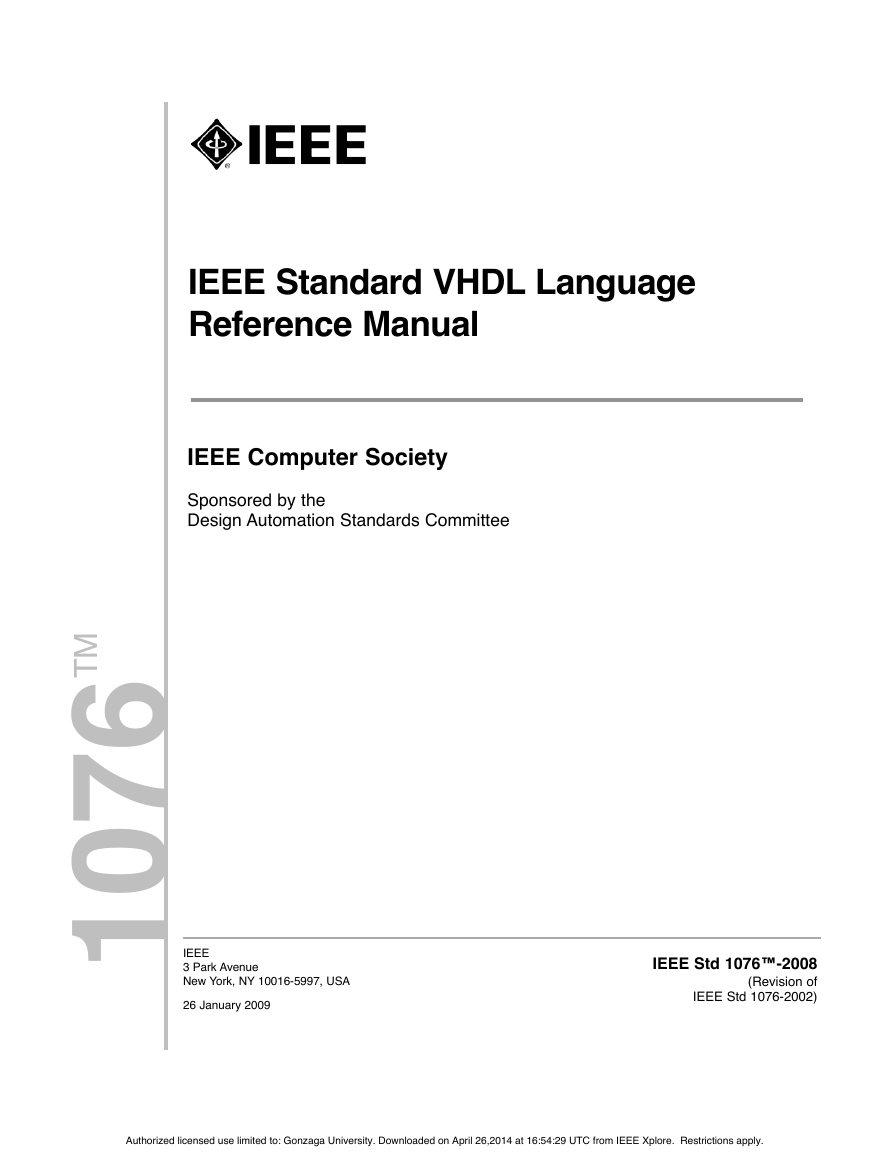
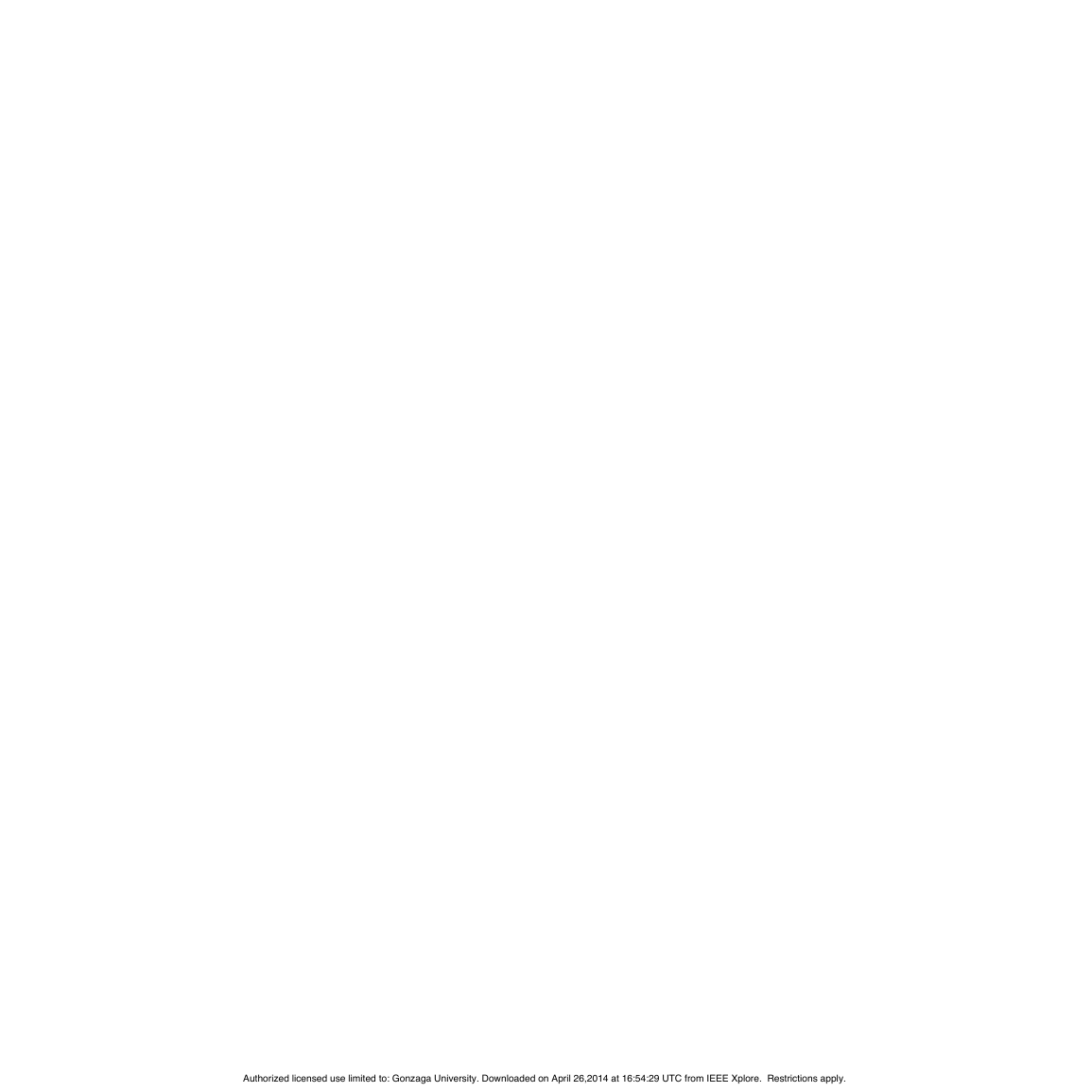
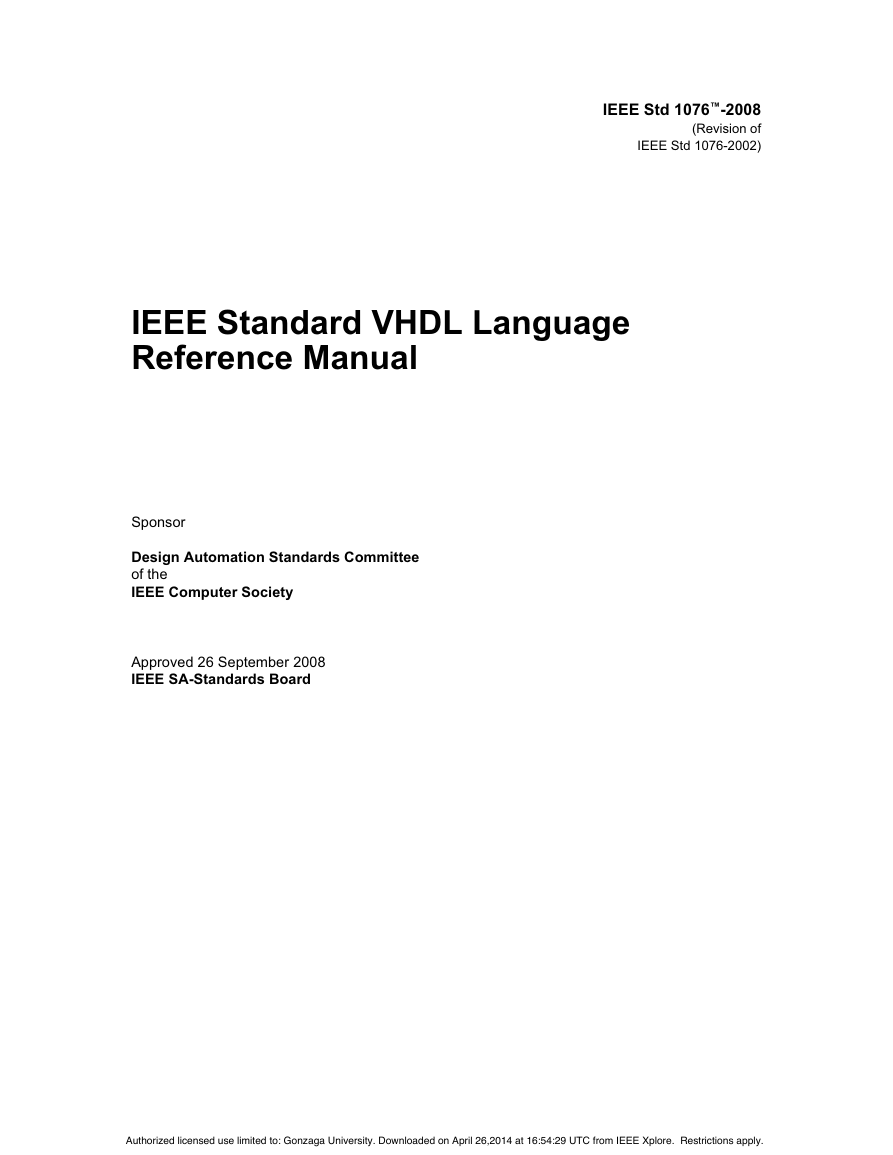
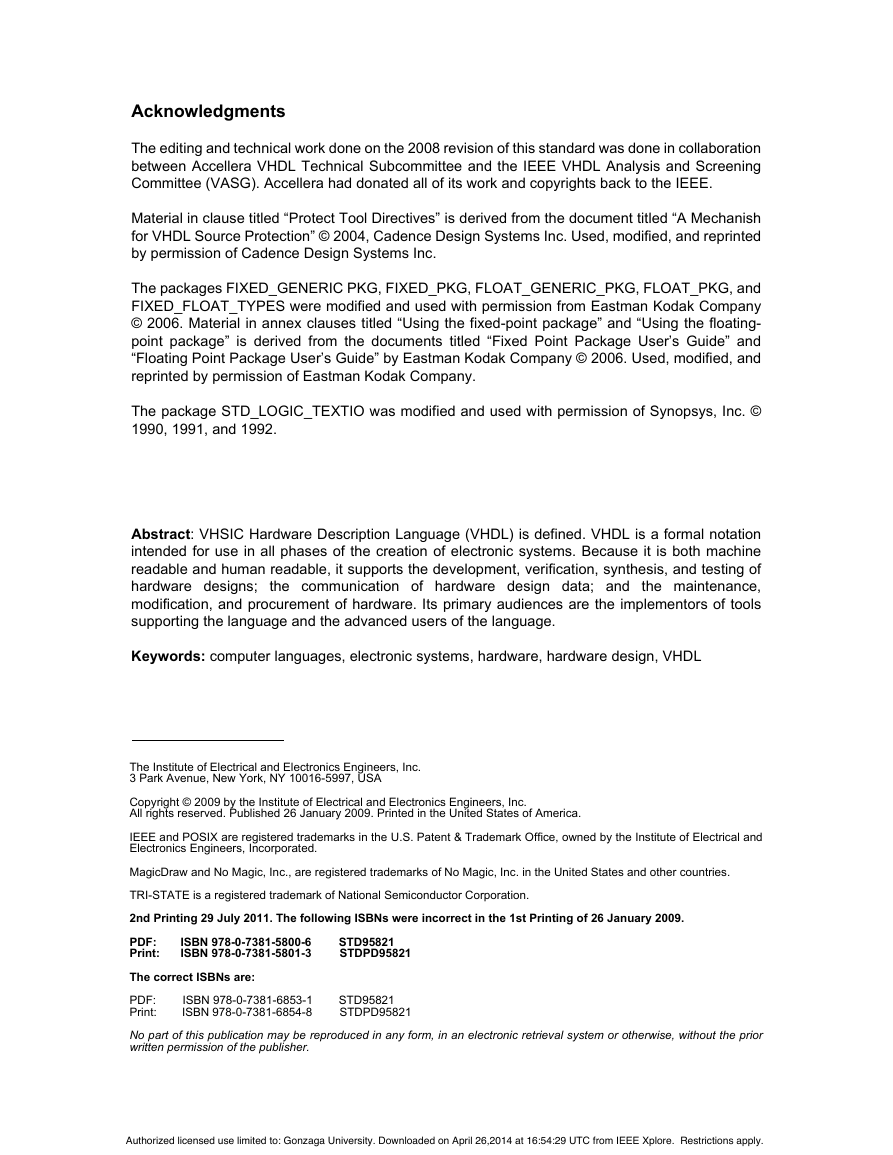
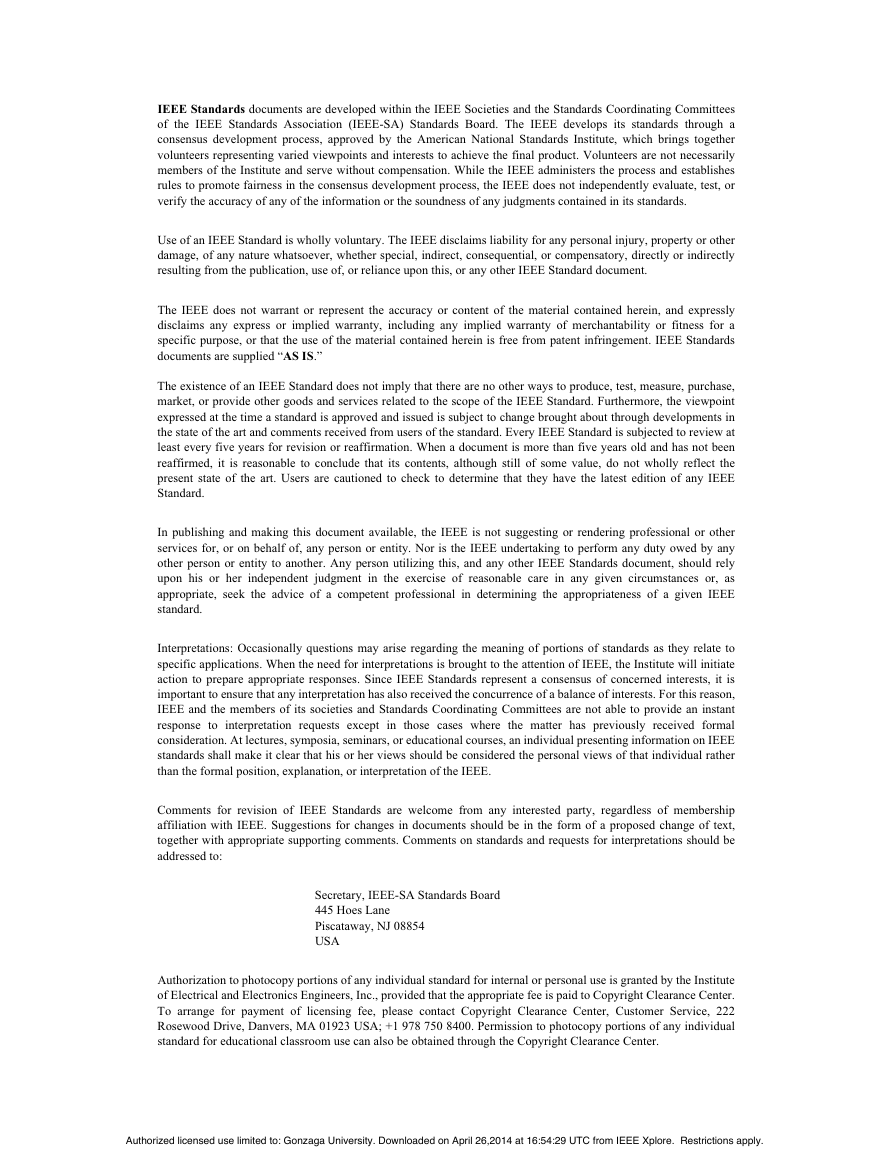
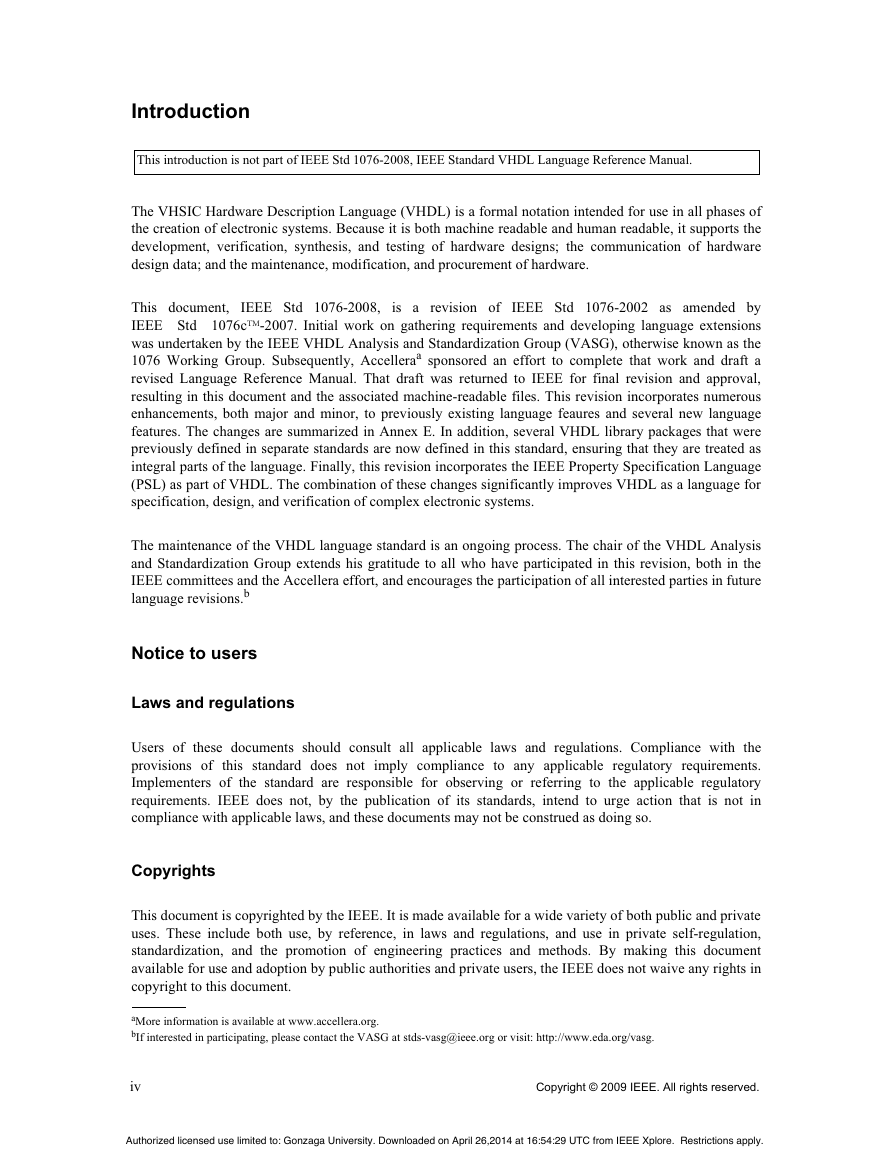
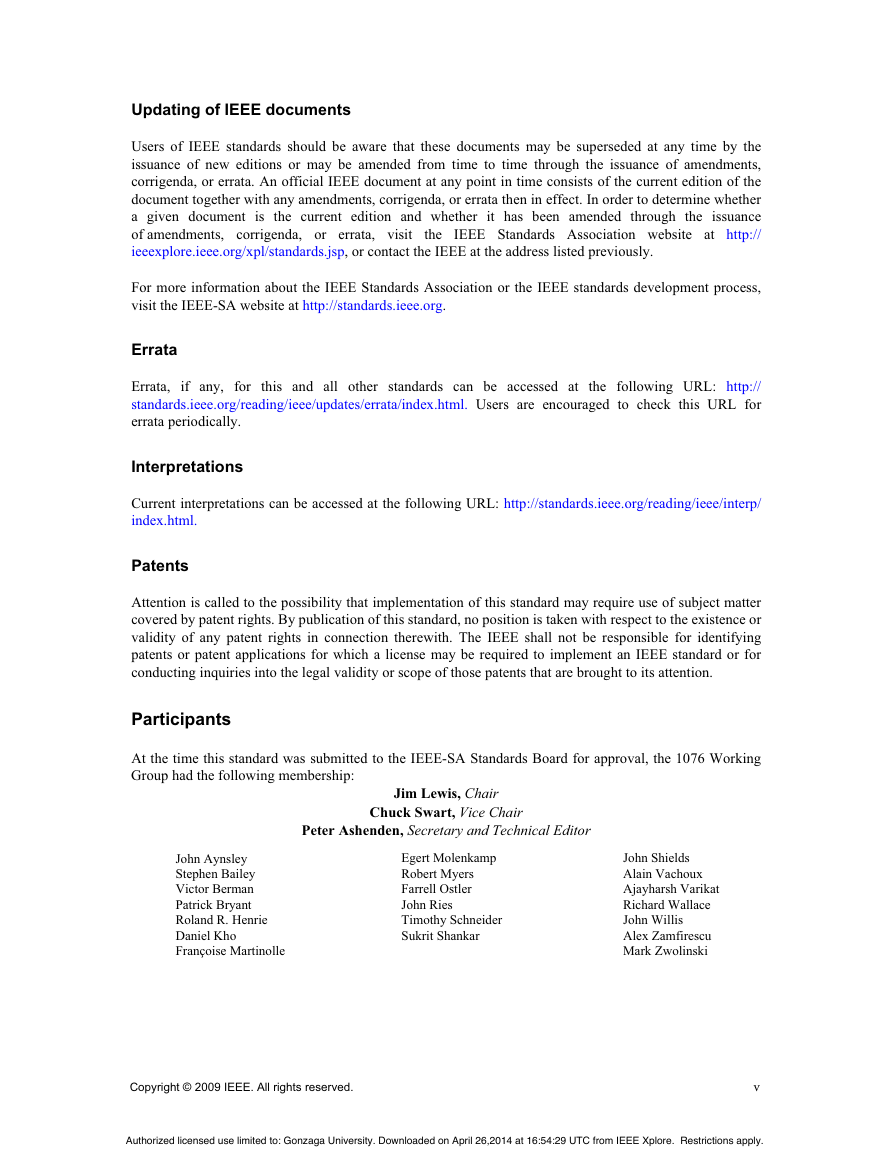
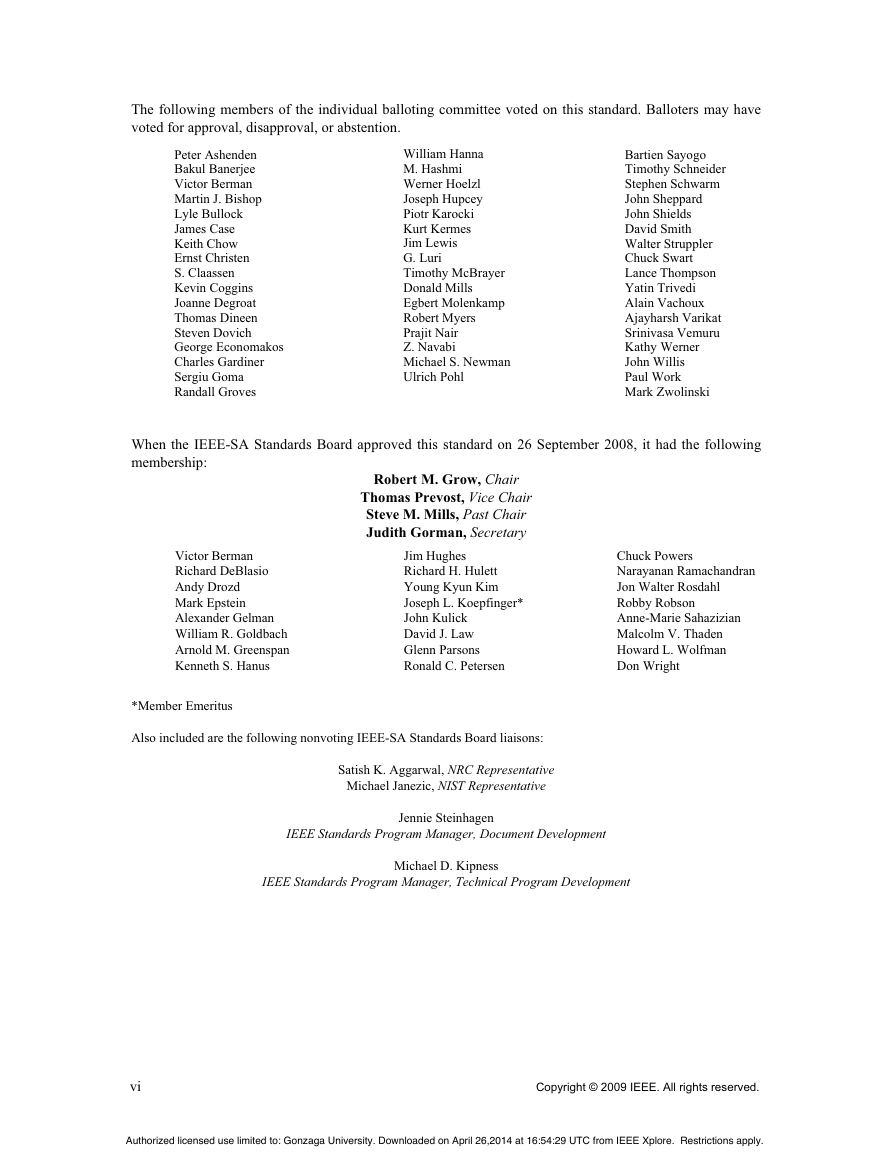








 2023年江西萍乡中考道德与法治真题及答案.doc
2023年江西萍乡中考道德与法治真题及答案.doc 2012年重庆南川中考生物真题及答案.doc
2012年重庆南川中考生物真题及答案.doc 2013年江西师范大学地理学综合及文艺理论基础考研真题.doc
2013年江西师范大学地理学综合及文艺理论基础考研真题.doc 2020年四川甘孜小升初语文真题及答案I卷.doc
2020年四川甘孜小升初语文真题及答案I卷.doc 2020年注册岩土工程师专业基础考试真题及答案.doc
2020年注册岩土工程师专业基础考试真题及答案.doc 2023-2024学年福建省厦门市九年级上学期数学月考试题及答案.doc
2023-2024学年福建省厦门市九年级上学期数学月考试题及答案.doc 2021-2022学年辽宁省沈阳市大东区九年级上学期语文期末试题及答案.doc
2021-2022学年辽宁省沈阳市大东区九年级上学期语文期末试题及答案.doc 2022-2023学年北京东城区初三第一学期物理期末试卷及答案.doc
2022-2023学年北京东城区初三第一学期物理期末试卷及答案.doc 2018上半年江西教师资格初中地理学科知识与教学能力真题及答案.doc
2018上半年江西教师资格初中地理学科知识与教学能力真题及答案.doc 2012年河北国家公务员申论考试真题及答案-省级.doc
2012年河北国家公务员申论考试真题及答案-省级.doc 2020-2021学年江苏省扬州市江都区邵樊片九年级上学期数学第一次质量检测试题及答案.doc
2020-2021学年江苏省扬州市江都区邵樊片九年级上学期数学第一次质量检测试题及答案.doc 2022下半年黑龙江教师资格证中学综合素质真题及答案.doc
2022下半年黑龙江教师资格证中学综合素质真题及答案.doc